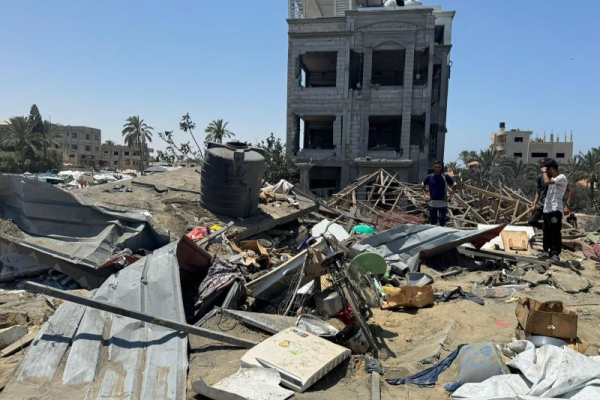
Palestinians look at the debris of destroyed tents and makeshift housing structures following an Israeli military strike on the al-Mawasi camp for internally displaced people, near the city of Khan Yunis, southern Gaza Strip, on July 13. A new report found polio in the sewage water of such damaged areas. File Photo by Saber Arar/UPI | License Photo
The Palestinian Ministry of Health said on Thursday that sewage samples taken in Gaza found the virus that causes polio.
The ministry said the samples were taken in conjunction with UNICEF and found in “the sewage that collects and runs between the tents of the displaced and in the places where the population is located as a result of the destruction of infrastructure.” Advertisement
The ministry said the discovery of polio is alarming because of the current “severe congestion” of the population and the scarcity of available water. It said the mounting garbage and lack of hygiene materials could lead to an epidemic.
“The monitoring of the polio virus in sewage threatens a real health catastrophe and puts thousands of people at risk of polio,” the ministry said, adding that the need of usable water and the repairing of sewage lines are needed.
The Israeli-Gaza war is now in its ninth month with sides engaged in delicate talks to reach an elusive cease-fire agreement.
The polio finding comes days after an Oxfam report that accuses Israel of using water as a weapon of war by cutting off external water supplies and “systemically” destroying water facilities in Gaza. Advertisement
The Oxfam report said the combination has reduced the available water in Gaza by 94% to 1.25 gallons of water per person or less than a single toilet flush.
“We’ve already seen Israel’s use of collective punishment and its use of starvation as a weapon of war,” Lama Abdul Samad, an Oxfam Water and Sanitation specialist, said in a statement. “Now we are witnessing its weaponizing of water, which is already having deadly consequences.”
The report charged that Israel has destroyed 70% of all sewage pumps and all of Gaza’s wastewater treatment plants. Gaza City lost nearly all of its water production capacity during the war and 88% of its water wells.